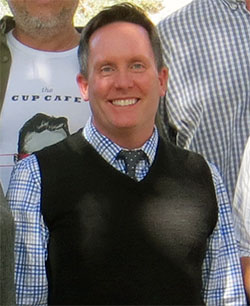
Associated Faculty: Michael K. Borgstrom
Founding Faculty, LGBTQ Research Consortium
Office: AL-271 | Phone: (619) 594-6284 | Email: [email protected]
 In my previous scholarship on LGBT issues, I've examined how sexuality, race, and
gender intersect in past eras, and I've been particularly interested in the ways that
queerness can augment our received knowledge about minority identity. In more recent
work, I've extended this focus into contemporary time periods, focusing on film and
popular culture. My current research links these historical and analytical interests
by considering how cultural production from earlier eras might help contextualize
the dizzying amount of recent interest in LGBT persons, and it also considers the
ideological repercussions of such attention. In the wake of extended discussions
and debates about LGBT civil rights (which have been primarily focused on marriage
equality), lots of people have articulated lots of opinions about queer identity and
culture. My new work examines some of the parameters of this debate, as well as the
resulting new social expectations attached to queer persons. Thus while a great deal
of LGBT scholarship has been dedicated, for example, to discussing specific queer
figures or analyzing aspects of queer identity, my current work takes a slightly different
trajectory; it aims to shift scrutiny away from queer people, as a group, and to appraise,
instead, broad cultural reactions to queerness. In considering how queerness has
become the subject of very public discussion, my new project explores a series of
questions that circulate around this topic: What does it mean to see queerness? What
does it mean not to see queerness? What are some of the social demands on queerness?
What does it mean to hate queerness? What does it mean to adore queerness?
In my previous scholarship on LGBT issues, I've examined how sexuality, race, and
gender intersect in past eras, and I've been particularly interested in the ways that
queerness can augment our received knowledge about minority identity. In more recent
work, I've extended this focus into contemporary time periods, focusing on film and
popular culture. My current research links these historical and analytical interests
by considering how cultural production from earlier eras might help contextualize
the dizzying amount of recent interest in LGBT persons, and it also considers the
ideological repercussions of such attention. In the wake of extended discussions
and debates about LGBT civil rights (which have been primarily focused on marriage
equality), lots of people have articulated lots of opinions about queer identity and
culture. My new work examines some of the parameters of this debate, as well as the
resulting new social expectations attached to queer persons. Thus while a great deal
of LGBT scholarship has been dedicated, for example, to discussing specific queer
figures or analyzing aspects of queer identity, my current work takes a slightly different
trajectory; it aims to shift scrutiny away from queer people, as a group, and to appraise,
instead, broad cultural reactions to queerness. In considering how queerness has
become the subject of very public discussion, my new project explores a series of
questions that circulate around this topic: What does it mean to see queerness? What
does it mean not to see queerness? What are some of the social demands on queerness?
What does it mean to hate queerness? What does it mean to adore queerness?
Download their Curriculum Vitae